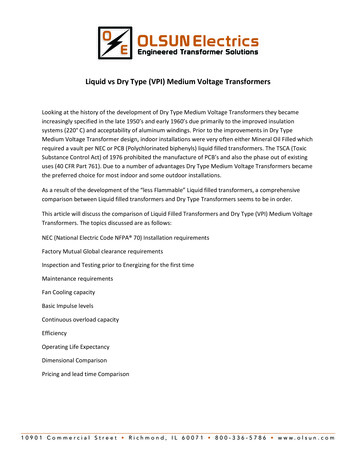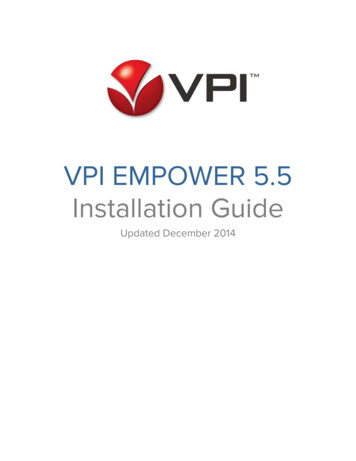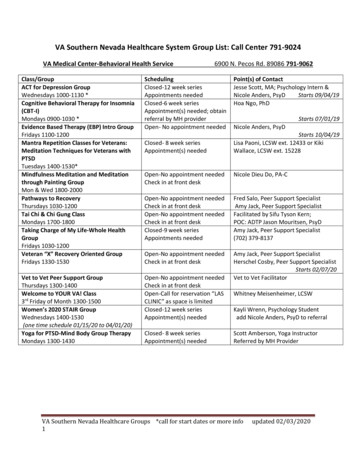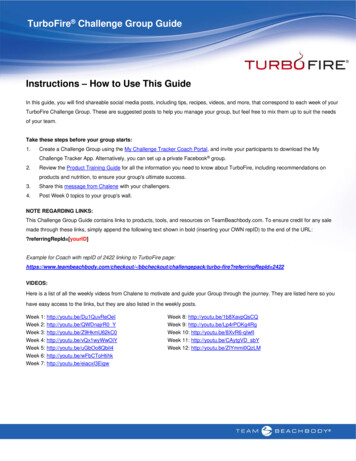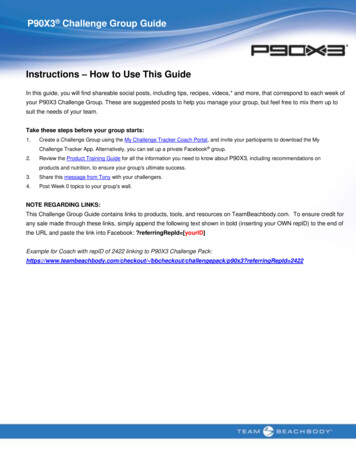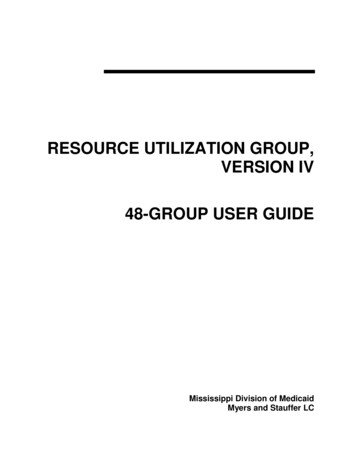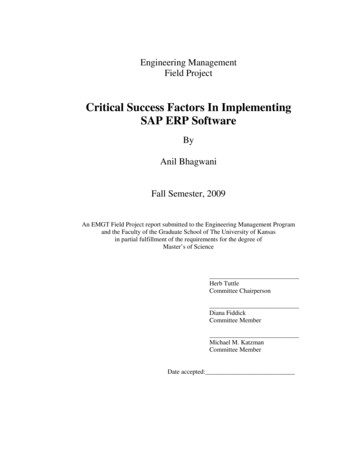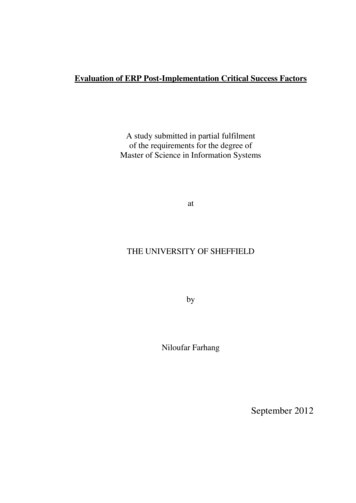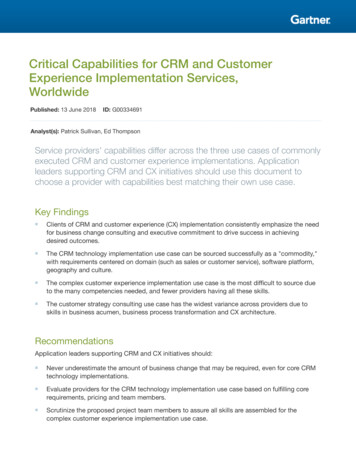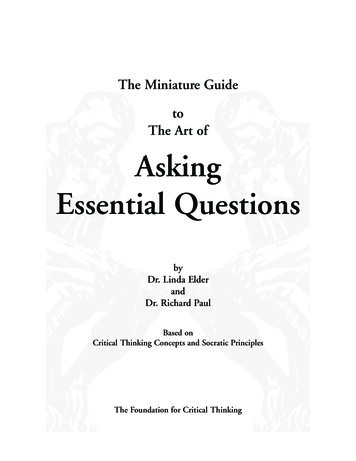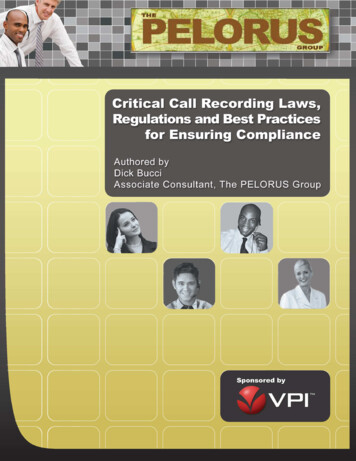
Transcription
Critical Call Recording Laws, Regulations andBest Practices for Ensuring ComplianceTable of ContentsGoals and Scope of this Guide . 2Payment Card Industry Data Security Standard (PCC-DSS). 3Telemarketing Sales Rule (TSR) . 4Truth in Lending Act (TILA). 6Fair Debt Collections Practices Act (FDCPA) . 7Consent to Record . 8Health Insurance Portability and Accountability Act (HIPAA). 9Family Medical Leave Act (FMLA) . 10To Learn More . 11Summary . 12About the Author . 13About VPI . 13Copyright 2009 Voice Print International, Inc. and The Pelorus Group. The information provided is believed to be accurate, but is presented withoutexpress or implied warranty and may change at any time without notice. You should always check laws and regulations with your legal counsel.Page 1
Critical Call Recording Laws, Regulations andBest Practices for Ensuring ComplianceRunning a contact center requires more skill sets than just about any other position in the enterprise.Managers are expected to be information technology experts, finance whizzes, inspirational coaches, andoccasionally amateur psychologists. Dare we add lawyers? Not necessarily, but compliance is playing alarger role in contact center performance than ever before. Violations can be very costly – not just in financialterms but in customer credibility as well. This does not mean you need to take time off to attend law school,but it does mean that you need to at least be aware of some of the many laws, regulations, and industrystandards that most profoundly effect contact centers. You also need to know what you can do to avoidproblems and where to go when you need help. Fortunately, many progressive vendors have incorporatedfeatures in their applications that help you comply.Goals and Scope of this GuideFirst, reading this paper won’t make you an expert and won’t relieve you of the necessity of checking withyour compliance officers or legal resources in time of need. However, we can almost guarantee that you willlearn something new and have a better understanding of the current legal and regulatory environment as itconcerns your specific responsibilities. We can’t empemphasizehasize enough that this is a very handy resource guide,not a legal document. We recommend that you become a member of a trade association that retains legalcounsel and issues periodic alerts and guidelines. If your firm or organization has a compliance office, workclosely with them to assure that the steps you take are the correct ones and in keeping with overall corporatepolicies and IT established processes. For more details, please refer to the table of resources on page 11.There are literally hundreds of federal, state, and local regulations that can affect contact center practices.We will discuss only the statutes and standards that – in the author’s view – most directly impact contactcenters. Further, the scope is limited to the United States, and primarily federal – not state - laws andregulations. Federal laws apply to interstate commerce. Typically, individual states enact similar legislationto address intra-state commerce. It is not unusual for state laws to be more restrictive than federal laws.The following table lists the statutes and standards covered in this paper and their primary focus.Abrev.FraudAbusePrivacyPayment Card Industry Data Security StandardPCI-DSS Telemarketing Sales RuleTSR TruthTruth in Lending ActTILA Fair Debt Collections Practices ActFDCPA Consent to RecordCTR Health Insurance Portability and Accountability ActHIPAA Family Medical Leave ActFMLALabor Copyright 2009 Voice Print International, Inc. and The Pelorus Group. The information provided is believed to be accurate, but is presented withoutexpress or implied warranty and may change at any time without notice. You should always check laws and regulations with your legal counsel.Page 2
Critical Call Recording Laws, Regulations andBest Practices for Ensuring CompliancePayment Card Industry Data Security Standard (PCC(PCC-DSS)Credit card fraud is a growing menace. According to the US Department of Homeland Security, the cost ofcredit and charge card fraud may be as high as 500 million a year. Identity theft was the number one sourceof consumer complaints to the FTC in 2007. And it's not just the credit card companies that are left holdingthe bag – cardholders often face economic losses, lengthy legal battles and struggles to re-establish cleancredit records.In order to reduce fraud, the Payment Card Industry (PCI), which consists of American Express, DiscoverFinancial Services, JCB, MasterCard Worldwide and Visa International, established the PCI SecurityStandards Council in September 2006. The aim of the council was to establish a set of rules that merchantsand service providers must comply with in order to accept payments through the credit and debit cardapparatus set up by the card vendors. While the council is managed by the card industry, membership isopen to any organization that participates in the payment processing system, including: merchants,processors, POS vendors, and financial institutions.The council subsequently issued a Data Security Standard (PCI-DSS) which details security requirements formembers, merchants and service providers that store, process or transmit cardholder data. The PCIregulations specifically forbid storing unencrypted credit card numbers, PIN numbers, and other specifiedidentifiers. Payment processors, service providers and merchants that process more than 20,000 ecommerce transactions and over 1 million regular transactions are required to engage a PCI-approvedQualified Security Assessor (QSA) to conduct a review of their information security procedures and scan theirInternet points of presence on a regular basis. However, no organization that accepts cards issued by thefounding members of the council is exempt from compliance.PCI-DSS is not a federal regulatory requirement. Merchants and service providers that do not comply aresubject to breach of their contracts which can result in termination of card acceptance privileges andsubsequent business losses. Minnesota and Texas have codified the PCI-DSS and at least 22 other stateshave enacted data security laws of some types. Others are in the process of formulating legislation.While the standard is primarily aimed at cardholder information in data bases, contact centers can easilybecome unsuspecting violators. This is because of the practice of collecting and entering card data into orderentry systems and recording private customer information in call and data recording systems. Unless agentsare specifically authorized to see this information, their unrestricted access is a violation of PCI-DSS and anunnecessary risk exposure. You can avoid potential violations by assuring that your CRM or orderprocessing system masks and mutes card information and by investing in recording technology that blocks orencrypts recordings that contain card numbers. Your recording software should be able to encrypt, mask, ormute card data from voice recordings and archived computer screen recordings.Copyright 2009 Voice Print International, Inc. and The Pelorus Group. The information provided is believed to be accurate, but is presented withoutexpress or implied warranty and may change at any time without notice. You should always check laws and regulations with your legal counsel.Page 3
Critical Call Recording Laws, Regulations andBest Practices for Ensuring ComplianceBest Practice Tips Work with your information technology department before implementing contact center-specific solutions.Compliance is an organization-wide commitment. IT may have an overall security plan that contactcenters must adopt. For example, individuals that require access to archived calls that may include carddata must be specifically authorized to access this information. Make sure your order entry, new customer applications, and any other customer data bases that youragents frequently access mask out credit, debit, and other sensitive information. Find out how your current recording software handles PCI-DSS compliance. Some vendors do not havea solution. Others may require deleting entire interactions that involve card transactions, making itimpossible to conduct quality evaluations on these calls or retrieve them for compliance or verificationpurposes. If you are considering a new interaction recording system, look into the approach adopted by VPI. VPIprovides secure, end-to-end encryption at no extra cost. For companies that prefer a more flexibleapproach, VPI CAPTURE call recording software can automatically detect when an agent enters a screenwhere a credit card field is to be filled out and then mask both the voice and screen entries for theduration of the agent’s activities while working in those screens. The recorder then reverts to normalrecording mode. Voice and data recordings mask the sensitive information, which can only be accessedby authorized personnel. Make sure you maintain strict processes that prevent agents from jotting down card numbers for laterentry into the customer data base.Telemarketing Sales Rule (TSR)The Telemarketing Sales Rule is the most comprehensive federal legislation aimed directly at contactcenters. While the primary intent is to prohibit fraud and abuse in outbound telesales environments, the TSRalso applies to inbound and blended environments if they engage in up-selling. Some organizations areexempt, such as political campaigns, charitable organizations, third party fundraising firms, common carriers,and certain financial institutions. Certain types of inbound calls are also exempt, such as unsolicited hotelreservations.The TSR requires material disclosures before orders may be accepted by phone. The specific disclosuresare spelled out in the TSR, but in general they include disclosing the identity of the seller, the nature of thegoods or services offered for sale, the full cost of all offers, any conditions or restrictions associated with theoffers, and business policies – such as handling order cancellations and returns. The disclosures may bemade by mail (in advance of accepting the order) or by phone during the telemarketing call. There arespecial rules for up-selling. If the second transaction in a single call involved a second seller, then the identityof the second seller must be provided. Another important provision prohibits sellers and telemarketers frommaking false or misleading statements. The FCC may assess a fine of up to 11,000 per violation.Copyright 2009 Voice Print International, Inc. and The Pelorus Group. The information provided is believed to be accurate, but is presented withoutexpress or implied warranty and may change at any time without notice. You should always check laws and regulations with your legal counsel.Page 4
Critical Call Recording Laws, Regulations andBest Practices for Ensuring ComplianceDepending on the method of payment, the seller may be required to obtain “Express Verifiable Authorization”(EVA) from the buyer. EVA may be secured in one of three ways: advance written authorization from theconsumer, written confirmation from the seller before the transaction is submitted for payment, or an audiorecording in the customer’s voice confirming the order. For added security, telemarketers will often transferthe call to a supervisor or other individual who will ensure that all disclosures were made and will ask for thecustomer’s concurrence. Of the available verification methods, call recording is the fastest, most convenient,and most foolproof. The audio recording must demonstrate that the buyer was provided with seven specificpieces of information.The Do Not Call provisions prohibit telemarketers and sellers (excluding exempted callers) from calling phonenumbers that are on the Do Not Call Registry. Agents may initiate outbound calls to individuals with whomthey have an existing relationship. This provision extends to third party collection agencies.There are now more than 155 million telephone numbers on the Registry. Since the FCC began enforcingcompliance with the Registry in 2003, the agency has secured more than 16 million in civil penalties andmore than 8 million in consumer redress.There is a common misconception that the TSR applies only to big telemarketing organizations. Not true.The rule applies to telephone sales workers, telemarketers, telefunders, and sellers. There are no businesssize limitations.Best Practice Tips Create scripts that assure that all required disclosures are made by the agent. Train agents on TSR requirements that directly effect the way they do their jobs. Record all voice and screen interactions that involve actual telephone sales or sales attempts. For maximum speed and convenience for retrieving calls pertinent to specific sales or sales attempts,consider investing in speech or screen analytics software. This is very helpful for dispute resolution. Telemarketing organizations should ensure that the latest Do Not Call registry is loaded on their dialersoftware and that the software can automatically detect and block calls to individuals on the list. Dialers should also be programmed to permit calls only during the times during which calls can be made(8:00 am to 9:00 PM) Pre-recorded sales messages are prohibited. Your organization must be adequately staffed to take live calls within two seconds of the time a personanswers the call and the automated greeting is completed. A safe harbor provision exemptsorganizations that use a dialer that ensures no more than 3% abandonment of answered calls.Copyright 2009 Voice Print International, Inc. and The Pelorus Group. The information provided is believed to be accurate, but is presented withoutexpress or implied warranty and may change at any time without notice. You should always check laws and regulations with your legal counsel.Page 5
Critical Call Recording Laws, Regulations andBest Practices for Ensuring ComplianceTruth in Lending Act (TILA)The Truth in Lending Act is intended to help assure that consumers are made fully aware of terms andconditions related to consumer loans. The Act also gives consumers the right to cancel certain credittransactions that involve a lien on a consumer's principal dwelling, regulates certain credit card practices, andprovides a means for fair and timely resolution of credit billing disputes. Disclosure rules are addressed inRegulation Z. Subsequent amendments prohibit the unsolicited distribution of credit cards and tightendisclosure requirements for home equity loans. TILA is primarily directed towards consumer lendinginstitutions including banks, credit unions, and finance companies.TILA differentiates between closed-end financing and open-end accounts. Closed-end lending refers to loanswith a definite term, such as auto loans and home mortgages. Open-end credit refers primarily to creditcards, home equity lines of credit, and other instruments that do not have fixed installment schedules. TILAdoes not apply to commercial loans, loans to government instrumentalities, credit in excess of 25,000 notsecured by real property, student loans, and securities brokers.Contact centers that are involved in home mortgages, credit cards, and other consumer lending activitiesmust be aware of the material disclosures required by TILA. Disclosures are typically provided in writing priorto consumer acceptance of any loan agreement but may also be provided during telephone interactions. Thegrowing trend to marketing credit cards and other loans over the Internet has increased pressure on contactcenters to understand the disclosure requirements of TILA. Applicants that are having trouble navigating theweb site will call the toll-free number for assistance.TILA provides very specific disclosure requirements for lenders. Examples include the methods by whichinterest rates are calculated, requirements to disclose the annual percentage rate, cost of late fees, paymentterm, advance notice of renewals and many other items consumers should know when evaluating the costand terms of credit.Best Practice Tips Record all voice and screen interactions. Increase evaluation frequency for new agents – check voiceand screen recordings for disclosures and accuracy of data entry. Consider adding screen analyticsapplications that automatically tag and categorize recordings based on events that occurred during thecall. This will help you quickly locate recordings that require frequent review. Prepare training materials and scripts that help assure that all mandatory disclosures are made. Update these materials every time there is a change in interest rates or payment terms. Provide agents with a list of subject matter experts in the event they need further clarification Review procedures with your compliance officeCopyright 2009 Voice Print International, Inc. and The Pelorus Group. The information provided is believed to be accurate, but is presented withoutexpress or implied warranty and may change at any time without notice. You should always check laws and regulations with your legal counsel.Page 6
Critical Call Recording Laws, Regulations andBest Practices for Ensuring ComplianceFair Debt Collections Practices Act (FDCPA)The FDCPA is designed to eliminate abusive, deceptive, and unfair debt collection practices. It also protectsreputable debt collectors from unfair competition and encourages consistent state action to protectconsumers from abuses in debt collection practices. While the FDCPA generally applies only to third partycollectors, some states such as California have state consumer protection laws which mirror the FDCPA, andregulate original creditors as well. Both third-party and in-house collectors must also be familiar with statebankruptcy and consumer protection laws. The largest violation to date was against debt collector LTDFinancial Services, which agreed to pay 1.3 million in civil penalties to resolve charges that it misled,threatened, and harassed consumers.The FDCPA mandates when calls can be placed (between 8:00 am and 9:00 pm), who can be contacted(only the debtor or his/her attorney), and where calls can be placed. When calling debtors, collectors mustidentify themselves, including the name of their firm, and explain that the purpose of the call is to collect adebt (“Mini-Miranda”). Among other provisions, the law expressly prohibits false, deceptive, or misleadingrepresentation or means in connection with the collection of any debt.Third party collection agencies are a major source of complaints to the Federal Trade Commission. Agenciesthat want to keep their clients and prosper in this highly competitive narrow-margin business must be on theirtoes to assure compliance. Since collectors have an existing business relationship with debtors, they are notsubject to
approach, VPI CAPTURE call recording software can automatically detect when an agent enters a screen where a credit card field is to be filled out and then mask both the voice and screen entries for the duration of the agent’s activities while work
